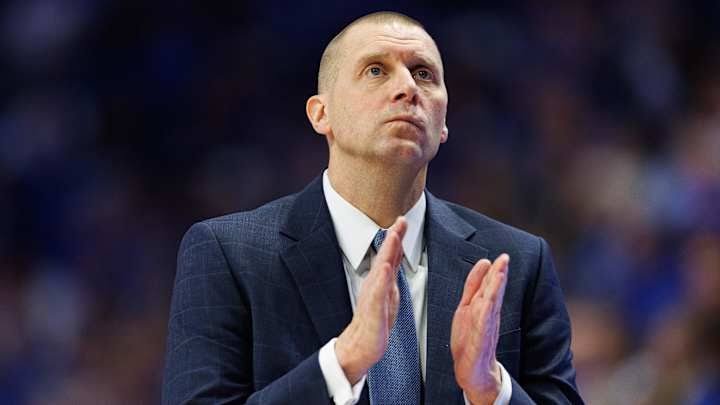Mark Pope has revitalized Kentucky basketball at a pivotal moment, injecting fresh energy into the program as it transitions from the John Calipari era. Despite early skepticism, Pope has silenced critics by assembling a competitive roster in record time, steering the Wildcats to six top-15 wins—including marquee victories over Duke, Gonzaga, Louisville, Florida, and Tennessee—and earning a top-15 ranking by early February. His success has defied expectations, proving he’s not just a temporary fix but a strategic leader capable of elevating Kentucky’s legacy.
Even Calipari, now at Arkansas, has lauded Pope’s impact: “Mark Pope is doing a great job—not just good. Kentucky’s execution speaks for itself. Losses happen, but this team moves forward.” Calipari’s endorsement underscores Pope’s ability to navigate high stakes, a trait essential in Lexington. Yet, after Kentucky’s recent 89-81 defeat to Calipari’s Razorbacks, some fans are questioning whether Pope’s early triumphs were a mirage. To those doubters: take a breath. One loss doesn’t erase progress, but it does highlight areas for growth.
A Rare Misstep in a Critical Moment
For the first time since his hiring, Pope stumbled under the spotlight. Facing his predecessor in a charged Rupp Arena—packed with legends like Tubby Smith and a raucous student section—Kentucky unraveled after halftime. Arkansas exploited defensive lapses, shooting 55% from the field and hitting 13 threes (nearly double their season average). The Wildcats, typically resilient in high-pressure games, looked disjointed, with puzzling lineup choices and fatigued rotations. Pope admitted postgame, “I need to be bolder—take more risks.” Yet in this pivotal matchup, aggression was curiously absent.
Arkansas, limited to eight scholarship players and missing their starting point guard, outworked Kentucky. Key Wildcats like DJ Wagner and Adou Thiero logged heavy minutes but lacked support, while promising freshman Trent Noah—coming off a career game against Tennessee—strangely never left the bench. “There’s space for him,” Pope acknowledged, “and I need to find it.” The loss exposed tactical flaws: poor load management, stagnant adjustments, and a failure to counterpunch. For a coach molded under Rick Pitino’s relentless ethos, the lack of urgency was uncharacteristic.
Perspective Amid the Noise
Yes, the defeat stings. But context matters. Pope inherited a fractured roster and built a contender in months, fostering a culture that’s reinvigorated the fanbase. His openness to criticism—joking that his ’96 championship teammates “will destroy me” after losses—shows self-awareness. The Arkansas game was a wake-up call, not a collapse. Great coaches adapt, and Pope’s track record suggests he will.
Kentucky’s ceiling remains high. The Wildcats have proven they can dominate elite teams; now Pope must refine their consistency. As Calipari wisely noted, “It’s one game.” The path forward isn’t about doubting Pope’s vision—it’s about trusting his capacity to learn. This isn’t the time for panic. It’s time for patience. The foundation is set. The next chapter awaits.
